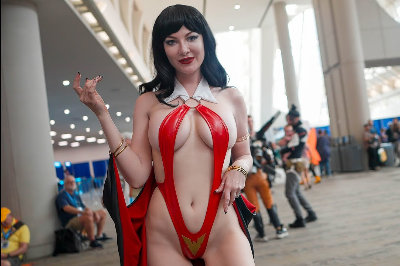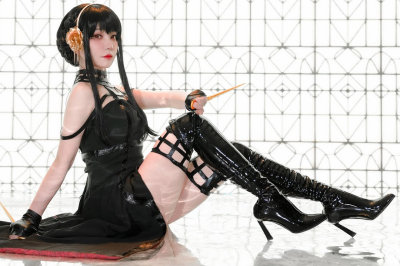EVIL aka ONDSKAN - Q&A with Mikael Hafstrom
Movie Interview by Toby White
Are Swedish private schools really like that? At least from that era?
This specific school was like that. It closed down in the mid 60s but it was more or less the way it's described in the film.
Were the student council, and the teachers ignoring it, true to life?
Yeah, that's how the system worked. When the main character, Erik, grew up he became a very famous Swedish journalist and one of his first gigs was to write about this school and his articles, together with others', actually brought the school down. The school is still there, it's now a recreation centre for golfers. So the same people are coming back [laughter].
How much of the film is based on that reality, then? Is it that school and that environment?
It's based on the book and the names are changed but it's not shot at the actual school. The book deals a lot with Erik in the years before he ends up at the school - and that's a very interesting story in itself - but we decided to concentrate on the school and make that the basic arena for the film. The interiors we tried to recreate, the dining area looks like it did for real.
When did you first become aware of the book and decide to make a film of it?
The book came out in the early 80s and it's the most read Swedish book of the last 20 years. Everyone in Sweden has read the book, especially young people. Even the teenager on the street, maybe he's read one book in his life and that's this book. It's also taught in schools. I read the book when I was young and I worked in Swedish TV, the equivalent of the BBC, and we discussed making it into a mini-series but I wasn't ready for that. I was too young, it was very complex material and I was making cop shows. There were five or six attempts to make a film out of this book, it's that popular so if you're a smart producer you want to make it. But all of these attempts failed. Even the author, Jan Guillou, wrote a script but even he said to me that it was quite shitty. I was asked by a producer friend to try to write the script so I took in a guy I worked with before and we wrote the script pretty quickly and showed it and...
What about the title? Because I understand the literal translation of "ondskan" is not actually "evil". Were you tempted to change the title for an English audience? People could assume it's a horror film...
I kind of like that title. "Ondskan" in Swedish is a word that has more dimensions than just "evil". The closest English word would be "menace". We looked at a lot of words but there was another film called "Menace" out already so we ended up with "Evil". But if people think it's a horror film then we get that audience as well!
How do you think it's going to be received over here?
The film has now been sold to 100 countries and has been received very well in most places. England is very close to home when it comes to this film. It's a boarding school drama which I've seen a lot of from this country. It's an environment that people in this country can relate to. So I think critics will have something to say about that. Obviously I hope it will be received well but there will be different opinions. If people have issues I don't mind if it's an interesting review.
When I was watching it I thought it might go in the direction of "If...", you know that film?
Lindsay Anderson, of course.
Where Malcolm MacDowell mows everybody down at the end...
Well, "If..." is very much in the same genre as this film, of course, but it's very much a product of its time. In the 60s. With very revolutionary angles. Of course I saw the film before doing this and other films I thought it were connected but it's very much a film from its era.
With such a history with the book in Sweden, how did it go down there?
That's a good question because we felt that everybody had read the book and that was great because it's a good starting point but it was also scary because of the fact that everybody has a strong relationship with it and knows Erik and if we f*ck that up people would come down hard on us. So I realised I had to make a film that stands on its own legs. And this has the heart and soul of the book but it is a film. It worked very well in Sweden, people accepted it as a film and it was one of the biggest commercial successes in Sweden so we can't complain.
You've certainly achieved a lot of international success with the film, you went to the Oscars in 2004 in the Foreign Language category, did that lead on to your directing job on DERAILED?
The Oscars was a bonus but we had the World Premiere at the Toronto Film Festival and a lot of Americans saw it and it was after that I started to get scripts. So DERAILED was on the go already when we got the Oscar nomination but it didn't really change anything when it came to my adventures over there.
How did it feel to make the leap to an American film?
Well, when you stand there with your actors and the camera it's not that much different. Shooting the film is more or less the same. It's the pre-production, and the casting, there are more people involved. When you shoot here there's a lot of people but it's not crazy, when you go to Chicago it's like, "What the f*ck is this? How am I going to shoot the scene in this mess with 500 people running around with headphones and I don't know what I'm doing?" [Laughter] But then like magic they all disappear and we can do something. The casting is the biggest difference because it takes a lot of time, also with actors you have agents and it takes forever to get things on paper. You have more time and more money but there are also more people so it's a slower process.
How long did EVIL take to shoot?
It took 30 days to shoot. On DE-RAILED I had around 60. But, shooting EVIL, I didn't have a lot of time. It was that problem of too little time, too little money.
In terms of the differences, DE-RAILED was shot in quite a few places whereas this film was shot in the one location, which do you prefer?
We shot the exteriors outside Stockholm but all the interiors were built in studios so it was the same kind of situation. But it's up to the film if you move around a lot. EVIL is very contained. We tried to find places but we couldn't find places from the pictures we had that were intact enough so you have to do so many compromises. So we decided to build everything. But Anna Asp, the production designer, did a very smart job building walls that could just turn around and go from the dining room to the classroom and things like that.
That's surprising because it does look like it's all on location...
And she and the DP had to work very quickly to pull it off in 30 days. Almost the whole film was shot on steadicam because that made us move faster. Even the static shots because it takes time to move the camera off the rig and onto a tripod.
With the popularity of the book, getting the casting right, particularly that of Erik Ponti, was absolutely essential, how did you pick Andreas Wilson?
Well, I started to look at 16 year-olds but they didn't have the experience that was required. The first thing I did was to put the age up to 20-21. I found everybody except Erik. Time went on and we were two and a half weeks before shooting and everybody started panicking because we didn't have the guy and he's in every scene in the film. It was extreme luck, I remembered a face that I saw at a birthday party a year before and I managed to track him down from people at the party and I called him and asked him to come in. And I remember I was in the studio in Stockholm talking to someone and I saw Andreas walking over in the distance and I looked at him and I thought, "That's him, that's Erik. If he can act just a little I can make it work." But it was obvious when I saw him that this was the guy. And I hired him the day after and sent him to a swimming school. It's great. He was working at a post-production house and now he has a Hollywood agent.
So he hadn't acted before?
He'd done some little theatre things but no films.
Did you have to teach him?
No, the thing with the character was that I couldn't find someone that could act him because you have to "be" him. I'm a director but I'm not a magician. Obviously I can direct actors but there are certain things you can't...and Andreas just had these things. I didn't spend any more time with him than anyone else. He's a natural.
Will you work with him again? Do you stay in touch?
Oh, yeah, he's here in London, we had a premiere last night and he's staying in my apartment. He's also a popular model now and goes everywhere but we try and meet when we can. And I feel I have a lot of responsibility for him so I try to see that he behaves himself.
Not going into too much detail but can you tell us a bit about DERAILED?
DE-RAILED is a Hitchcockian thriller about a married man that meets a married woman and they start a relationship and everything goes downhill. I'm a big fan of Hitchcock, I've seen his films since I was a kid so he means a lot to me.
Have you any other influences? With the visual style of EVIL?
No, but we tried to establish a style. We saw a lot of American films from the 50s, Rebel Without A Cause and films like that, just to see the period and the atmosphere but we tried not to make it too fancy to distract the audience from the drama. It's very easy to do things like that and often when a director feels insecure about the story and the characters he starts to move the camera for no reason. That's very irritating. Yeah, it looks great but it's not hard to do great camera moves, its much harder to create interesting characters. We tried to find a style that went with the milieus and the interiors and find contrasts and stuff like that.
What are your immediate plans for the future?
For the weekend or for the rest of my life? [Laughter]
Well, do you want to go for a pint?
Yeah, I would love a pint...I'm going to finish DERAILED, it's another two weeks in post. Then I'm going to do another movie with Miramax and I'm working on another couple of projects with other studios. You need to have three or four projects going because so few films actually happen. But I'm in a good situation. EVIL is extremely popular in the Hollywood community and I get a lot of offers.
Are you a confirmed Hollywood director then?
Well, whatever we call Hollywood film...DERAILED is American money but the actors and crew are from England. I don't know what a Hollywood movie is nowadays, it's not like is used to be. It's definitely not a Swedish film, that's for sure.



